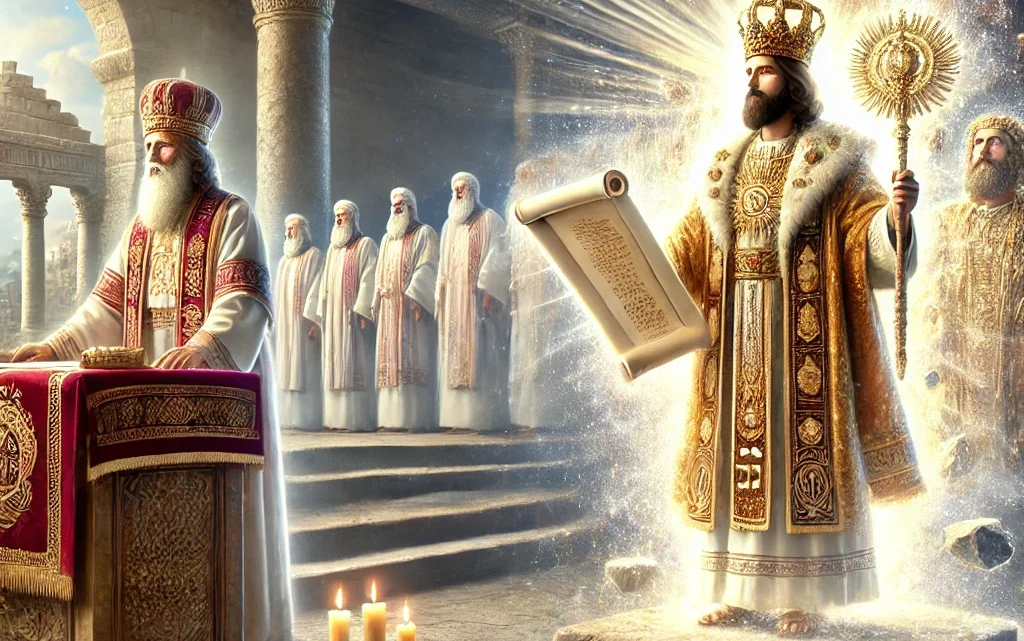We are Priests under the Order of Melchizedek: There is No Longer a Need for the Aaronic Priesthood

In the vast history of God’s people, the Aaronic (or Levitical) priesthood played a critical role, especially under the old covenant. Priests descended from Aaron, brother of Moses, were ordained to offer sacrifices and mediate between Israel and God. These sacrifices were central to atonement and worship, and the priests’ role served a vital function before the divine.
But now, as followers of Yeshua (Jesus) , we stand in a different, fulfilled relationship with God. Indeed, Jesus’ advent brought about seismic shifts, not only in humanity’s reconciliation with God but in how that relationship is mediated. Through His life, death, and resurrection, Yeshua became our eternal High Priest , rendering the old system of the Aaronic priesthood unnecessary.
We are Now All Priests in the Order of Melchizedek
Throughout the New Testament, particularly in the Book of Hebrews, Jesus is depicted as being of a higher order than that of Aaron — He is a priest “forever, after the order of Melchizedek” (Hebrews 7:17). This ancient king-priest, Melchizedek, is seen as a figure without beginning or end, whose priesthood is eternal. Unlike the Aaronic priests, who had to continually offer sacrifices for sins — for themselves and the people — Christ’s sacrifice was once for all (Hebrews 9:11-12).
What this means for us today is profound: Jesus has ushered us into a new priesthood . Through faith in Him, we are no longer separated from God, reliant on an earthly priest to offer sacrifices for us. We are now called to be a “royal priesthood” (1 Peter 2:9), a community of believers who share direct access to God through the work of Jesus Christ on the cross.
The Temple Has Moved – Into Our Bodies
Along with the shift from the Aaronic priesthood comes another fundamental transformation: the temple is no longer a physical structure built from stone and mortar, but rather, it resides within us.
Paul writes in 1 Corinthians 6:19:
“Do you not know that your bodies are temples of the Holy Spirit, who is in you, whom you have received from God?”
This means the sacred space where God meets His people is no longer confined to a temple, as it was in the time of the Old Testament, but rather, God dwells within us through His Spirit. Our bodies, therefore, have become temples themselves, places where holy ordinances are performed—not by an external priest, but by ourselves, through our lived experience of faith.
We Perform the Ordinances on Our Own Bodies
In this new paradigm, the sacrificial system has been fulfilled in Christ, and the ordinances we perform are spiritual and practical acts of worship. As Paul encourages in Romans 12:1:
“Therefore, I urge you, brothers and sisters, in view of God’s mercy, to offer your bodies as a living sacrifice, holy and pleasing to God—this is your true and proper worship.”
Unlike the physical sacrifices of the old covenant, the ordinance of this new priesthood involves the daily offering of our lives, our actions, our hearts in devotion to God. We align our lives with His will and offer ourselves as His instruments in the world. Instead of the shedding of blood, it’s the laying down of our selfish desires, the transformation of our character, and the pursuit of holiness that mark our participation in this new priestly office.
In Summary:
- The Aaronic Priesthood is No Longer Needed : With the coming of Christ, the old priesthood and its sacrificial systems have been fulfilled. No more sacrifices for sin are required because Yeshua’s sacrifice was once for all, perfect and eternal.
- We are Priests in the Order of Melchizedek : Through faith in Christ, we are all part of a new royal priesthood in the order of Melchizedek—a higher, eternal priestly role. We have direct access to God.
- Our Bodies are the New Temple : God’s dwelling place is no longer a building but within us. Our bodies are now temples of the Holy Spirit, and we must live in a way that honors this divine presence.
- We Perform Spiritual Ordinances on Our Own Lives : The ordinances we observe now aren’t external rituals involving altars and sacrifices but the living offering of ourselves—our thoughts, actions, and hearts—as a continual sacrifice to God.
This post seeks to draw us into a deeper understanding of where we stand in God’s redemptive story, encouraging us to embrace our identity as priests in the order of a higher priesthood and to live lives that reflect our temples-in-the-holy-spirit reality. There’s a beautiful symmetry here: just as ancient priests mediated between the people and God, now we, as His people, act as priestly mediators of His grace and love to the world.

